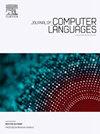Toward efficient vibe coding: An LLM-based agent for low-code software development
IF 1.8
3区 计算机科学
Q3 COMPUTER SCIENCE, SOFTWARE ENGINEERING
引用次数: 0
Abstract
The Software Engineering (SE) domain increasingly adopts low-code and no-code approaches to simplify application development and deployment. Two dominant paradigms have emerged in this space: Model-driven Engineering (MDE), leveraging Domain-specific Languages (DSLs) to abstract implementation and reduce the knowledge and expertise required, and LLM-based vibe coding, where developers interact with Large Language Models (LLMs) using natural language, allowing for rapid prototyping and code generation through conversations. Although DSLs provide precise abstractions and formal correctness, they often require specialized knowledge and have a steep learning curve. Conversely, vibe coding enables fluid and natural interactions, but struggles with domain specificity and frequently produces erroneous or unstructured code, which is difficult to integrate into formal development workflows. To harness the strengths of both paradigms, we present DSL Agent, an LLM-powered conversational interface for DSL-based application development. The DSL Agent is embedded within Locsys, a modern low-code development platform. It combines the flexibility and intuitiveness of LLM-based vibe coding with the rigor of DSLs by dynamically generating accurate and valid DSL models based on user descriptions, embedded into a unified conversational interface that leverages prompt engineering and in-context learning techniques. This offers a simpler and more intuitive interface, accelerates the development process, and reduces the expertise barrier. The agent is evaluated by more than 130 workshop participants of varying expertise levels, on two DSLs of different complexity. Evaluation metrics, including valid model rate, user satisfaction, and development time, indicate a significant improvement in valid model generation, productivity, and ease of use compared to traditional DSL-based SE workflows. These results highlight the potential of the DSL Agent to improve the entire DSL-based development life cycle by offering an efficient, intuitive, and user-friendly interface.
迈向高效的氛围编码:用于低代码软件开发的基于llm的代理
软件工程(SE)领域越来越多地采用低代码和无代码方法来简化应用程序开发和部署。在这个领域出现了两个主要的范例:模型驱动工程(MDE),利用领域特定语言(dsl)抽象实现并减少所需的知识和专业知识,以及基于llm的vibe编码,开发人员使用自然语言与大型语言模型(llm)交互,允许通过对话快速原型和代码生成。尽管dsl提供了精确的抽象和形式正确性,但它们通常需要专门的知识,并且具有陡峭的学习曲线。相反,vibe编码支持流畅和自然的交互,但是与领域特异性斗争,并且经常产生错误或非结构化的代码,这很难集成到正式的开发工作流中。为了利用这两种范式的优势,我们提出了DSL Agent,这是一个基于DSL的应用程序开发的基于llm的会话接口。DSL代理嵌入在Locsys中,这是一个现代的低代码开发平台。它结合了基于llm的vibe编码的灵活性和直观性与DSL的严密性,根据用户描述动态生成准确有效的DSL模型,嵌入到统一的会话界面中,利用即时工程和上下文学习技术。这提供了一个更简单和更直观的界面,加速了开发过程,并减少了专业知识障碍。该代理由130多名不同专业水平的研讨会参与者对两个不同复杂程度的dsl进行评估。评估指标,包括有效的模型率、用户满意度和开发时间,表明与传统的基于dsl的SE工作流相比,在有效的模型生成、生产力和易用性方面有了显著的改进。这些结果突出了DSL Agent通过提供高效、直观和用户友好的界面来改进整个基于DSL的开发生命周期的潜力。
本文章由计算机程序翻译,如有差异,请以英文原文为准。
求助全文
约1分钟内获得全文
求助全文
来源期刊

Journal of Computer Languages
Computer Science-Computer Networks and Communications
CiteScore
5.00
自引率
13.60%
发文量
36
 求助内容:
求助内容: 应助结果提醒方式:
应助结果提醒方式:


